Waseda University Volunteer Academy – Learning About an Inclusive Society Through Supporting People With Disabilities and Parasports
Mon, Nov 3, 2025-
Tags
On Tuesday, October 14, 2025, the “Waseda University Volunteer Academy – Learning about an inclusive society through supporting people with disabilities and parasports” was held at the International Conference Hall (Ibuka Masaru Memorial Hall) in Building 18 on the Waseda Campus, with 96 students, faculty, and staff members participating.

The academy was held with the aim of deepening interest and understanding in volunteers who support people with disabilities and parasports, as well as contributing to the realization of an inclusive society through practical experience necessary for supporting people with disabilities. The academy was planned and run with the cooperation of the NPO STAND, based on the academies that Shimizu Corporation has been holding regularly since 2015 across the country for university students and local governments with the aim of deepening knowledge about people with disabilities and parasports and contributing to the training of volunteers.
Keynote speech by Kazuko Ito

Following the opening remarks, Kazuko Ito (Representative Director of NPO STAND and Advisory Committee Member of the U-SPORTS PROJECT of the Japan Sports Agency), a leading expert in parasports support in Japan, gave a keynote speech on basic knowledge and mindset regarding parasports and volunteering.
Ito said, “The original meaning of ‘volunteer’ is voluntary and proactive. In Japan, volunteer activities can have a heavy and stiff image, but I would like people to first and foremost keep in mind the intention to work voluntarily.”
Next, the participants were divided into two groups: the visually impaired group and the wheelchair group, and they received lectures and practical training. The groups were switched every 70 minutes, and everyone participated in both groups.
Keynote speech by Yusuke Hatsuse

The “Visual Impairment” section began with a lecture by Yusuke Hatsuse (representative of Japan in Judo for the Visually Impaired at the 2008 Beijing Paralympics and Vice President of the Japan Paralympians Association).
Hatsuse shared his personal experience of becoming visually impaired due to glaucoma and falling into deep despair, but returning to judo, which he had devoted himself to in high school, and competing in the 2008 Beijing Paralympics, which led to him coming to terms with his disability.
Practical experience ~Visually impaired edition~
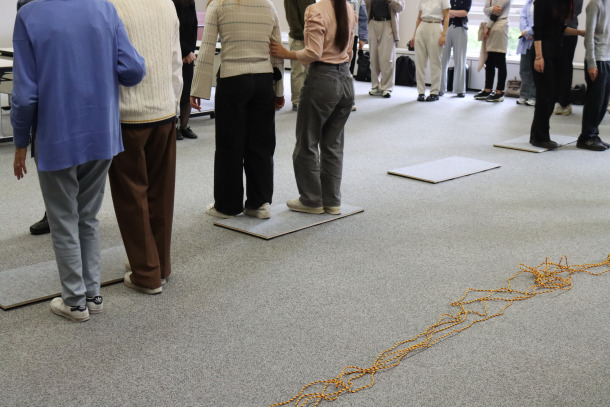
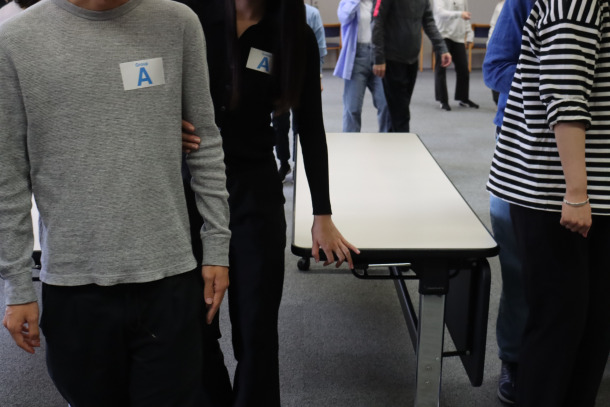
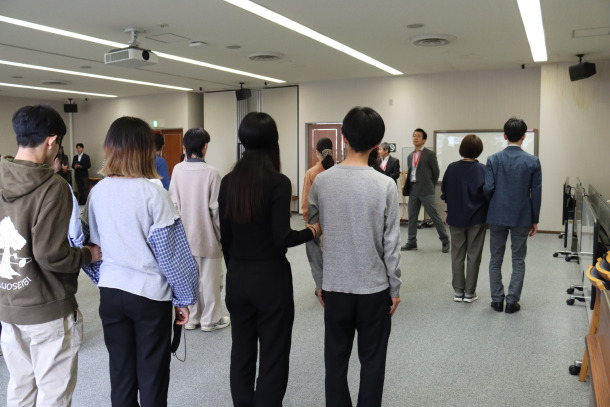
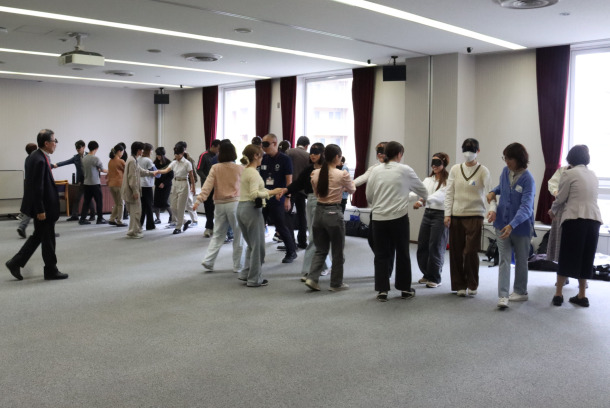
Afterwards, two staff members from the Tokyo Support Center for the Visually Impaired, a social welfare corporation run by the Japan Council of Social Welfare for the Blind, gave practical instruction in guiding visually impaired people while wearing eye masks in pairs. Through practical exercises such as overcoming steps, sitting safely in a chair, and passing between obstacles, the participants gained a real sense of the anxiety and fear that visually impaired people feel when walking, and learned the support methods needed to eliminate this anxiety and fear.
Keynote speech by Nobukazu Hanaoka
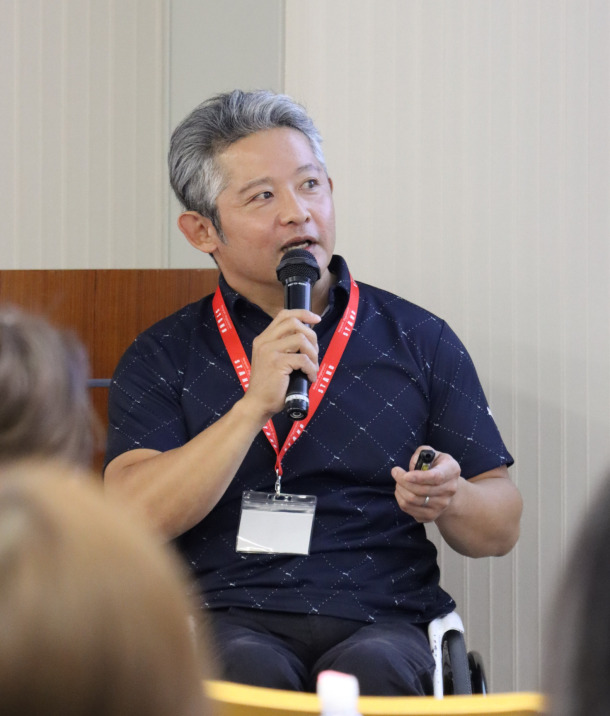
The first speaker in the “Wheelchair Edition” session was Nobukazu Hanaoka (5th place in the marathon at the 2012 London Paralympics/Chairman of the Kanto Para Athletics Association, an NPO).
He shared his experiences, including how he suffered a spinal cord injury in a motorcycle accident in his third year of high school, which forced him to use a wheelchair, how he then took up wheelchair athletics and competed in two Paralympics, and how he is currently devoted to supporting para-athletics athletes and mentoring the next generation.
Practical experience ~Wheelchair edition~
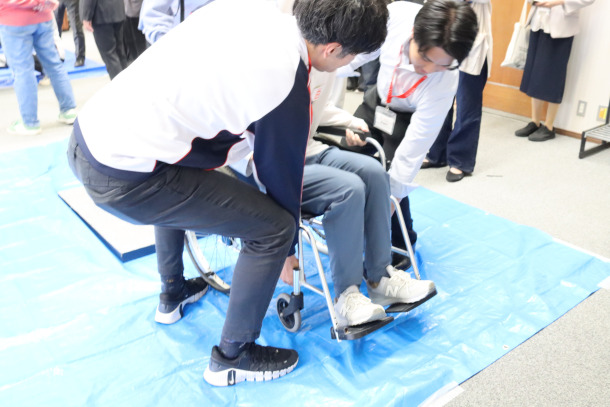
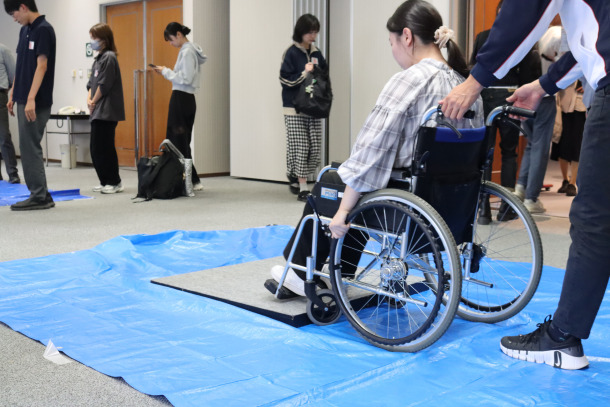
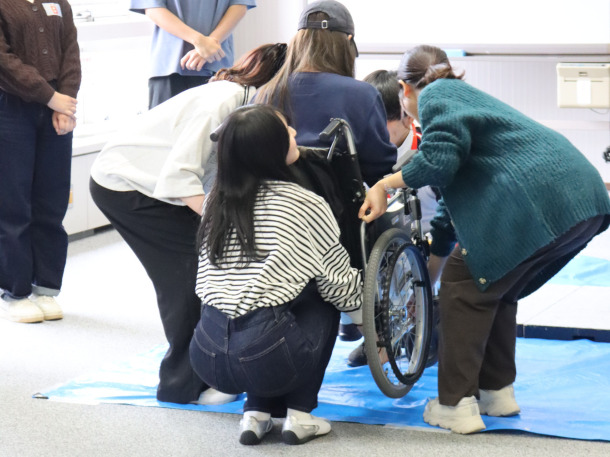

Afterwards, the participants were divided into four groups and given practical instruction by four physical therapists on how to get over steps in wheelchairs. They experienced firsthand how difficult it is to get over a 5cm step and realized that there are many barriers in society for people with disabilities. Some participants asked the physical therapists questions about the structure of wheelchairs and what improvements could be made, indicating that they had taken on the challenge with a very high level of awareness.
By hearing directly from leading experts in parasports support and para-athletes, and by actually experiencing detailed practical training, the participants were able to acquire new knowledge and skills, making it a very meaningful experience. We hope that the experience at this academy will change participants’ attitudes toward people with disabilities, broaden their perspectives, and give them an opportunity to think about what an inclusive society should look like.
Comments from participants (excerpts)
“I don’t think I’ve been able to do even the most basic thing before, like “speak up to someone in need,” but thanks to this event I was able to learn how to speak up and what to do afterwards. I think the needs of each person in need will vary, but I definitely feel I can do more than I could before the event. If I have the opportunity, I will definitely put it into practice.”“I liked the fact that I could both talk and experience it. I have actually guided people before, but it was good to learn better ways. I realized that even a simple word of encouragement can change things, and that barriers are everywhere.”
“Learning how to guide visually impaired people has given me the courage to speak to them, something I didn’t have before. I hope that by guiding them correctly, I can alleviate the anxiety of people with disabilities.”
“It was a valuable experience that I had never had before. The experience is temporary, but for the person involved, the situation will continue forever, so I want to remember that.”
“It was my first time handling a real wheelchair, so I was glad to be able to experience everything from how to handle it to how long it takes to sit in it. I learned a little bit about the various ways to guide visually impaired people. I would like to gain more practical experience.”
“I learned firsthand how scary it is to be blind, and I will be more mindful of people like that in my future life.”
“I was shocked to learn that in the practical section for the visually impaired, when they were told there was a step, they were worried because they didn’t know whether it was uphill or downhill. I realized that I still only think from my own perspective.”
“It was great to be able to experience the perspective of a person with a disability and to be carefully taught what is necessary as a caregiver. The talk by the para-athlete who gave the lecture was interesting, and the instructor’s detailed response was excellent.”













